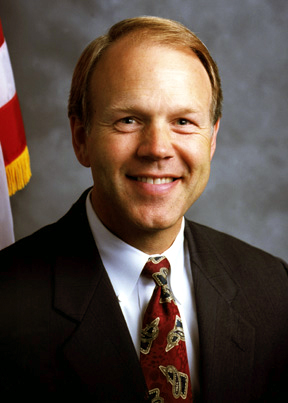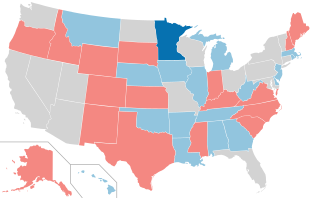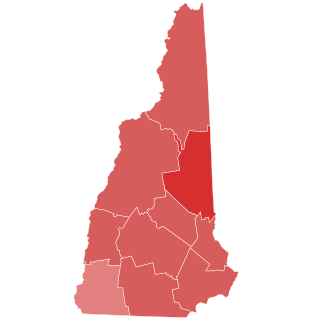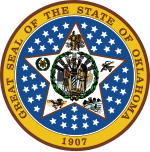
Donald Lee Nickles is an American politician and lobbyist who was a Republican United States Senator from Oklahoma from 1981 to 2005. He was considered both a fiscal and social conservative. After retiring from the Senate as the longest-serving senator from Oklahoma up until that point, he founded the Nickles Group, a lobbying firm.

Henry Louis Bellmon was an American Republican politician from the U.S. State of Oklahoma. A member of the Oklahoma Legislature, he went on to become both the 18th and 23rd governor of Oklahoma, mainly in the 1960s and again in the 1980s, as well as a two-term United States Senator in the 1970s. He was the first Republican to serve as Governor of Oklahoma and, after his direct predecessor George Nigh, only the second governor to be reelected.

The 1990 United States Senate elections were held on Tuesday, November 6, 1990, with the 33 seats of Class 2 contested in regular elections. Special elections were also held to fill vacancies. The Democratic Party increased its majority with a net gain of one seat from the Republican Party. The election cycle took place in the middle of President George H. W. Bush's term, and, as with most other midterm elections, the party not holding the presidency gained seats in Congress.

The 1986 United States Senate elections were elections for the United States Senate. Held on November 4, in the middle of Ronald Reagan's second presidential term, the 34 seats of Class 3 were contested in regular elections. The Republicans had to defend an unusually large number of freshman Senate incumbents who had been elected on President Ronald Reagan's coattails in 1980. Democrats won a net of eight seats, defeating seven freshman incumbents, picking up two Republican-held open seats, and regaining control of the Senate for the first time since January 1981. This remains the most recent midterm election cycle in which the sitting president's party suffered net losses while still flipping a Senate seat.

The 1984 United States Senate elections were held on November 6, with the 33 seats of Class 2 contested in regular elections. They coincided with the landslide re-election of President Ronald Reagan in the presidential election. In spite of the lopsided presidential race, Reagan's Republican Party suffered a net loss of two Senate seats to the Democrats, although it retained control of the Senate with a reduced 53-47 majority. Democrats defeated incumbents in Illinois and Iowa, and won an open seat in Tennessee, while Republicans defeated an incumbent in Kentucky.

The 1982 United States Senate elections were held on November 2, 1982. They were elections for the United States Senate following Republican gains in 1980. The 33 Senate seats of Class 1 were up for election in 1982. A total of four seats changed hands between parties, with Democrats winning seats in New Jersey and New Mexico, and Republicans taking seats in Nevada and the seat of the lone independent, Senator Harry Byrd Jr., in Virginia. Democrats made a net gain of one seat bringing them to 46 seats, while Republicans stayed at 54 seats for a majority. However, the Democratic gain in New Jersey replaced a Republican that had been appointed earlier in the year.

The 1980 United States Senate elections were held on November 4, coinciding with Ronald Reagan's victory in the presidential election. The 34 Senate seats of Class 3 were contested in regular elections. Reagan's large margin of victory over incumbent Jimmy Carter gave a huge boost to Republican Senate candidates, allowing them to flip 12 Democratic seats and win control of the chamber for the first time since the end of the 83rd Congress in January 1955.

The 1978 United States Senate elections were held on November 7, in the middle of Democratic President Jimmy Carter's term. The 33 seats of Class 2 were contested in regular elections. Special elections were also held to fill vacancies.

The 1974 United States Senate elections were held on November 4, with the 34 seats of Class 3 contested in regular elections. They occurred in the wake of the Watergate scandal, Richard M. Nixon's resignation from the presidency, and Gerald Ford's subsequent pardon of Nixon. Economic issues, specifically inflation and stagnation, were also a factor that contributed to Republican losses. As an immediate result of the November 1974 elections, Democrats made a net gain of three seats from the Republicans, as they defeated Republican incumbents in Colorado and Kentucky and picked up open seats in Florida and Vermont, while Republicans won the open seat in Nevada. Following the elections, at the beginning of the 94th U.S. Congress, the Democratic caucus controlled 60 seats, and the Republican caucus controlled 38 seats.

The 1968 United States Senate elections were elections for the United States Senate. Held on November 5, the 34 seats of Class 3 were contested in regular elections. They coincided with the presidential election of the same year. The Republicans picked up five net seats in the Senate. This saw Republicans win a Senate seat in Florida for the first time since Reconstruction.

George Patterson Nigh is an American politician and civic leader from the U.S. state of Oklahoma. Nigh served as the 17th and the 22nd governor of Oklahoma and as the eighth and tenth lieutenant governor of Oklahoma. He was the first Oklahoma governor to be re-elected and the first to win all 77 counties in the state. Additionally, short term vacancies in the governor's office twice resulted in Nigh assuming gubernatorial duties while serving as lieutenant governor.

The 1914 United States Senate elections, with the ratification of the 17th Amendment in 1913, was the first time that all seats up for election were popularly elected instead of chosen by their state legislatures. And thus it became the first time that they were generally scheduled on Election Day to coincide with the U.S. House elections. The 32 seats of Class 3 were contested in regular elections in 1914. Special elections were also held to fill vacancies. These elections occurred in the middle of Democratic President Woodrow Wilson's first term.

The Oklahoma Republican Party is the Oklahoma state affiliate of the Republican Party (GOP). Along with the Oklahoma Democratic Party, it is one of the two major parties in the state.

The 2004 United States Senate election in Oklahoma took place on November 2, 2004. The election was concurrent with elections to the United States House of Representatives and the presidential election. Incumbent Senator Don Nickles decided to retire instead of seeking a fifth term. Fellow Republican Tom Coburn won the open seat.

The 1980 United States Senate election in Georgia was held on November 4, 1980. Incumbent Democratic U.S. Senator and former Governor of Georgia Herman Talmadge ran for reelection to a fifth term, but lost narrowly to Mack Mattingly, Chairman of the Georgia Republican Party.

The 1990 United States Senate election in New Hampshire was held on November 6, 1990. Incumbent Republican U.S. Senator Gordon J. Humphrey decided to retire and not run for re-election to a third term. Republican Bob Smith won the open seat, easily defeating the Democratic nominee, former senator John A. Durkin.

The 1998 United States Senate election in Oklahoma was held November 3, 1998. Incumbent Republican U.S. Senator Don Nickles won re-election to his fourth and final term. Nickles won in a landslide, carrying all but one of the 77 counties in the state. The sole county Democratic candidate Don Carroll won was Haskell County.

The 1992 United States Senate election in Oklahoma was held November 3, 1992. Incumbent Republican U.S. Senator Don Nickles won re-election to his third term.

The 1986 United States Senate election in Oklahoma was held on November 3, 1986. Incumbent Republican U.S. Senator Don Nickles won re-election to his second term.

The 1968 United States Senate election in Oklahoma was held November 3, 1968. Incumbent Democratic U.S. Senator Mike Monroney was running for re-election to a fourth term, but was defeated by Republican Henry Bellmon. This election was the first time since 1942 that a Republican won a United States Senate election in Oklahoma and the first time since 1920 that a Republican won a United States Senate election in Oklahoma for this seat.























